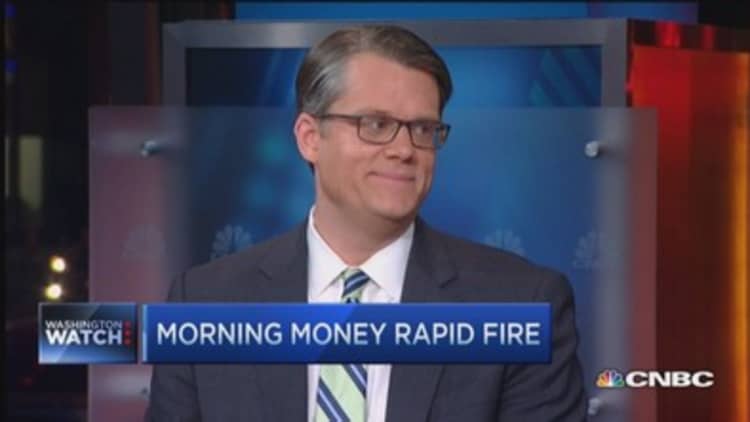
Welcome back to debt ceiling drama!
The nation's borrowing limit is getting reinstated Monday, and the clock will start ticking toward possible default sometime in October or November when the Treasury runs out of "extraordinary measures" to keep paying the bills.
Will the U.S. default? Almost certainly not. Will getting the debt limit raised (or suspended again) be a terrible mess that ripples through markets and dents the economy? Probably. Why should this time be any different?
The coming debt limit fight could be even worse than usual given other deadlines and political forces in play. The debt limit will begin to pinch just as Congress needs to pass a new spending bill to keep the government open past the Oct. 1 start of the 2016 fiscal year.
We'll get a preview of just how challenging that could be this week when House and Senate Republicans release competing budget blueprints. The documents don't mean that much—they are a starting point for coming up with spending figures for 2016. But the data are likely to display big differences between the two chambers on spending levels for defense, how to deal with the sequester cuts and when to bring the budget into balance.
Read MoreCNBC Explains: The debt ceiling
Sen. Lindsey Graham, R-S.C., declared to The New York Times that the GOP is "at war" with itself over defense spending, with fiscal hawks fighting military hawks.
All that needs to get worked out before the GOP can even begin dealing with congressional Democrats and the Obama White House on bills to raise the debt ceiling and fund the government. Democrats will demand a "clean" debt limit and government funding bills including no discretionary or entitlement spending cuts. They will be backed by nominee-in-waiting Hillary Clinton, who will not want to go into the 2016 election year with Democrats caving to GOP austerity demands.
But Republicans, especially in the House, will laugh off "clean" bills as political impossibilities. What will they demand in return for raising the debt limit? Who knows? Possibilities include approval of the Keystone XL pipeline, changes in President Barack Obama's immigration actions, big spending cuts or some combination of all of those requests.
Read MoreWhy Hillary's email issue won't go away...entirely
In recent fiscal showdowns, the GOP House led by Speaker John Boehner has eventually caved and passed mostly clean bills with a heavy dose of Democratic support.
That could well happen again—and in the end it probably has to—but House Republicans will also not want to go into 2016 giving in to Obama. So they could push it to the last possible moment. Senate Republicans, meanwhile, will have an entirely different calculus. Majority Leader Mitch McConnell has said he will not allow the nation to default. He knows doing so—or even coming close—would put the GOP's majority at risk in a year when they will have many marginal seats at risk.
But that concern could run into the possibility that vulnerable GOP senators will want to avoid primary challenges from the right. To avoid those battles, they will have to show they are tough on the Obama administration and not inclined to give the president a clean debt limit increase or government funding measure.
Read More$100 million? Jeb Bush's high expectations problem
All of these GOP political incentives will run into a president who has proposed easing the sequester spending caps by $80 billion for 2016, split evenly between defense and domestic programs. Republican defense hawks are likely to back the military spending side of this equation but not the nondefense side.
While there is an alternate scenario for the debt limit and government spending that is far less scary for markets and the economy, it seems significantly less likely. In this scenario, both parties decide a giant fiscal fight in late 2015 is just too risky and unpredictable for 2016 and find some early path to fund the government and raise the borrowing limit.
A deal under this scenario would include a reduced sequester (though not by as much as the White House wants), more defense spending (though not as much as the hawks want) and at least a couple of goodies for House Republicans (possibly Keystone). That type of arrangement is theoretically possible. But getting to it before everyone freaks out over a potential default will not be easy.
—Ben White is Politico's chief economic correspondent and a CNBC contributor. He also authors the daily tip sheet Politico Morning Money [politico.com/morningmoney]. Follow him on Twitter @morningmoneyben.


